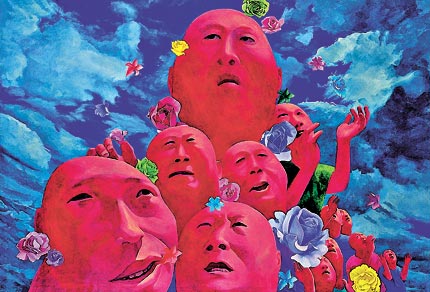30 years of contemporary Chinese art
|
|
|
Fang Lijun's "98.10.1" (1998), oil on canvas |
Covering 30 years of Chinese contemporary painting in one exhibition is a daunting task, but not for the Minsheng Art Museum.
The opening show in the new museum features 100 canvases painted by 80 artists who made history.
Most of the works in "30 Years of Chinese Contemporary Art" are on loan from private collectors, museums and art organizations in China. Some are on public view for the first time.
According to He Juxing, director at Minsheng Art Museum, the exhibition shatters the misconception that "the main collection of Chinese contemporary art is in the hands of the West."
"In fact, many of the excellent artworks are still in China, which proves the taste, judgement and the power of Chinese collectors," says He.
"Encountering these 100 paintings on such a big scale, the 30 years of Chinese contemporary art seem to unfold in front of the viewers," says Zhou Tiehai, the museum's vice director.
Some of the works are milestones, such as Chen Danqing's "Tibetan Series," Yang Feiyun's "19 Years" and Luo Zhongli's "Sky."
The paintings also evoke nostalgia in many viewers; one artists says he himself became choked up when seeing his own work and remembering what life was like in those days.
Museum director He elaborates on his observation that many important works remain in China. "For example, realism perhaps was a cliche in the early 1980s in Europe, but it was a pioneering art language in China after the stereotyped Russian styles. Some of these were not favored by the Western collectors with their own cultural and artistic sensibilities. However, these artworks actually have had a profound influence in the history of Chinese contemporary art."
Selecting the "right" piece from each representative period for the exhibition required a mature team, including art critics Li Xianting, Fei Dawei and Wang Min'an, who all systematically offered their comments.
"Lyricism is an indispensable part of Chinese oil paintings," says Wang. "It resulted from the cult of leadership, the praise of heroes, the belief in elevating the master in a great country above an emancipated class."
According to Wang, the traditional lyrical framework of humanitarianism? "the emphasis on the true, the good, and the beautiful," was completely destroyed at the turn of the 1980s and 1990s in three ways.
First, the past was appropriated and rewritten, thus, some sets of classic images were recalled and reemployed. Second, positions were taken to directly oppose humanitarian lyrical painting and to thoroughly overturn the good and the beautiful. Third was to rewrite and activate realistic painting techniques - the melting of realism and specific distortion.
Visitors can find examples of Wang's categories in the exhibition.
Minsheng Art Museum, supported by Minsheng Bank, plans to occasionally invite celebrities in different fields to discuss their experience in art as well as life experience.
The upcoming talk will be held by Mao Yan on June 23.
"We don't want this museum to be a silent one," said Vice Director Zhou. "It will be a platform for public art education, a support for young artists and a serious academic center."
Following this painting exhibition, the Minsheng Art Museum will show "Thirty Years of Chinese Video."
Date: through July 18 (closed on Mondays), 10am-9pm
Address: Bldg F, 570 Huaihai Rd W.
Admission: 20 yuan
 0
0 








Go to Forum >>0 Comments